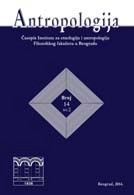Mind the Gaps! Politics, Power and a Space for Anthropology
Mind the Gaps! Politics, Power and a Space for Anthropology
Author(s): Katy FoxSubject(s): Anthropology, Political Philosophy, Pragmatism
Published by: Институт за етнологију и антропологију
Keywords: power; state; policy; engaged anthropology; public anthropology; pragmatism;
Summary/Abstract: This article is an attempt to think through two kinds of ‘gaps’ that researchers need to deal with. It is argued that what is at stake is much more than a mere conceptual or theoretical issue but one that has implications in the world. The first gap exists between the policies devised by national or supranational authorities and the ‘local level’. How to account for both sides of the ‘gap’ that exists between the policies and the people? I will argue here that it is less helpful to rely on concepts such as ‘the political’ or ‘the state’, but more fruitful to make power a central concern of the analysis. Reaching across pragmatic, methodological and epistemological issues, I would like to take seriously the question whether a ‘"dwelling perspective", [can] be combined with the recognition that human lives are lived collectively within fields of power’ (Ingold 2005a: 501). The other ‘gap’, pointed out at least since the advent of universities in Europe or, perhaps, even since Antiquity, is the one which exists between the academy and the wider world, and which, I would like to suggest, has similar structures of becoming as the first one. The corollary question that is treated in this article is both normative and practical, and regards the use of anthropology in the contemporary world, asking why anthropologists have not been, as could be expected, commentators on pressing social, both local and global issues. I then pose the question whether, and how, anthropology can speak outside of academia, and in how far the structure of academia acts as an impediment with regards to this aim. The paper first offers to deconstruct the assumptions embedded in certain conceptualisations of the state by proposing alternative ways of including the state more usefully in anthropological analysis and ethnography than has been done so far. This is then opened up by a discussion of general interest of what anthropology could be for, concluding, with Gledhill, that ‘we can be active and more engaged participants in the messy intersecting fields of power that we study’ (2004: 38).
Journal: Antropologija
- Issue Year: 7/2007
- Issue No: 1
- Page Range: 22-39
- Page Count: 18
- Language: English

